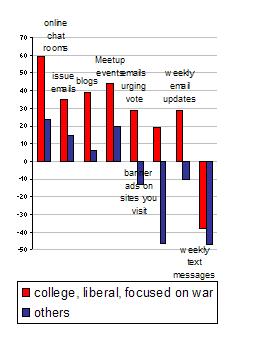« January 13, 2004 | Main | January 16, 2004 »
January 14, 2004
young people and Internet campaigns
We released a survey today that contains a lot of data about young people--their civic and political behavior and attitudes, and specifically their reaction to the ways political campaigns are using the Internet.Campaigns are effectively using the Internet to reach young people, and will
continue to do so
Despite a general lack of enthusiasm for many online campaign techniques, however, there are some pools of young voters who do like the new technologies. For example, those college students and college graduates who are liberal and concerned about the War in Iraq are overwhelmingly aware of blogs and favor their use in campaigns by 68%-32%. This group also likes “banner ads”and weekly email updates, which are unpopular among youth in general.
The graph shows the percentage who like each campaign technique, minus those who don't like it or call it a "turn-off." We distinguish liberal college students who are concerned about the war (red bars) from other youth (blue).
These findings put the Dean phenomenon in context. The demographic group that most likes his campaign themes is also most favorable toward electronic campaigning. It is not at all clear that blogs and Meetup events would work nearly as well for other candidates. Given that strong partisans and well-educated youth are most enthusiastic about the new technologies in politics, the Internet looks like a means to organize core voters, not a way to expand the franchise
Posted by peterlevine at 1:07 PM | Comments (0) | TrackBack
do business schools belong in universities?
I often ask myself this question as I arrive at work, since my office is in a building dominated by a business school. I'm all for programs that train effective business executives. But should these programs be subsidized by state universities and nonprofit institutions? Should they use academic norms such as tenure and peer-review? Why not just have for-profit training academies? There may be a great case for academic business schools, but I'm not sure.
For one thing, I'm not convinced that the debate in business schools is nearly broad or fundamental enough. In my university's Department of Government & Politics, faculty and students adopt and debate a wide variety of opinions. Some are anarchists or libertarians who are against both government and politics. Some want to see them radically changed. Others like and defend our current forms of politics and government. In contrast, business schools seem to treat businesses as self-evidently good. My own view is not hostile to business, but I do believe in robust debate in universities.
Perhaps it would be more fair to compare business schools to professional schools, which exist to train practitioners (not simply to promote debate). But even here, the comparison is not flattering to business schools. Quite a few law professors criticize the law wholesale, from various perspectives on the left and right. Even medical schools harbor radical critics of medicine, such as the libertarian Thomas Szasz. I do not see trenchant criticism of business coming out of business schools.
More important, business and medicine are professions that impose clearly defined public responsibilities on their members. Society subsidizes professional education, which is the only route to participation in certain fields. Because entrance to the "learned professions" is limited, those who graduate from professional schools can command high pay. But in return, we ask them to serve the public in specified ways. We impose no similar obligations on business people (with the exception of chartered public accountants). So do business schools belong in universities?
P.S., posted on Jan. 15: According to a story in the Chronicle of Higher Education, "Faculty members at leading business schools will join with the chief executive officers of some of the nation's top companies in a new ethics institute that will be housed at the University of Virginia's Darden Graduate School of Business Administration, officials announced on Wednesday." Sounds like a start ...
Posted by peterlevine at 12:24 PM | Comments (2) | TrackBack